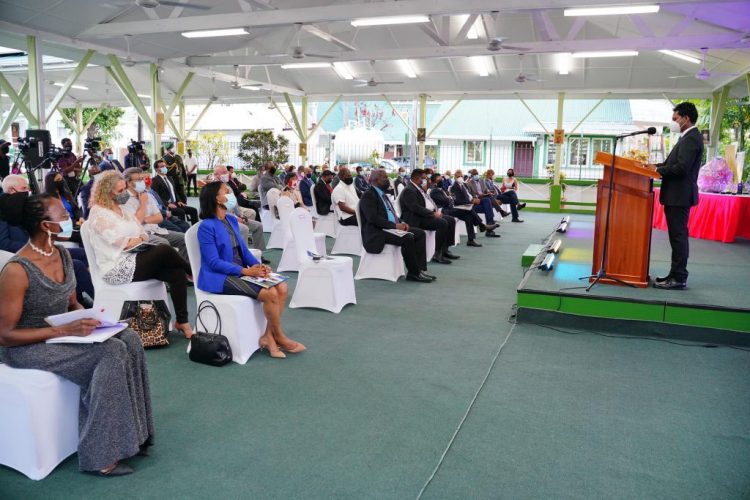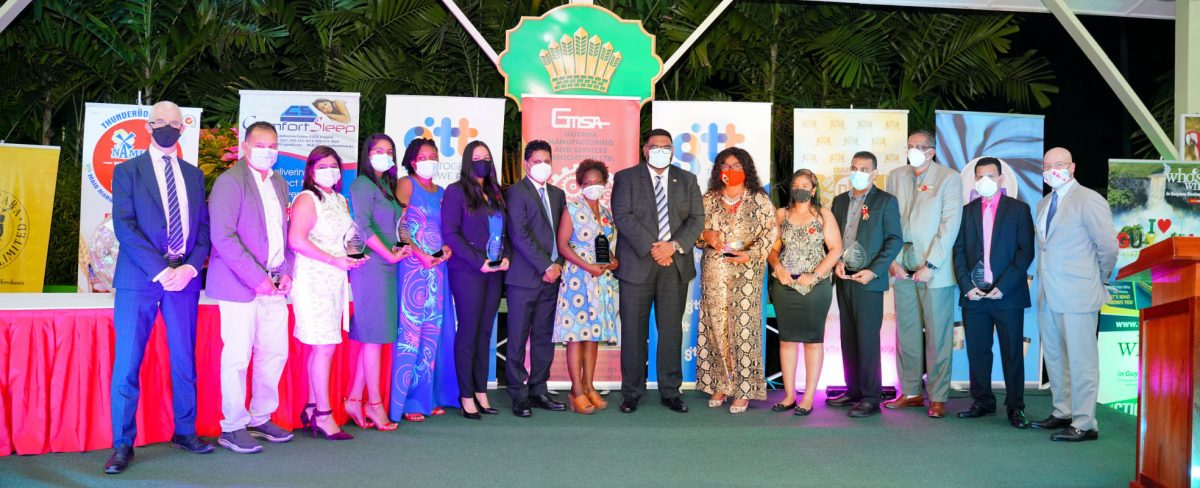Despite being optimistic about the year ahead, the aftermath of the March 2 Regional and General Elections compounded with the coronavirus pandemic have had a major detrimental impact on the manufacturing sector.
Several small and medium-size enterprises have been forced to close operations and many required a financial lifeline to stay afloat.
These comments were uttered by the President of the Guyana Manufacturing and Services Association (GMSA), Shyam Nokta, in his address at the annual awards ceremony held at State House last night. Nokta remarked that the post-elections period marred with uncertainty, proved to be a difficult time for manufacturers, and coupled with the COVID-19 pandemic only made matters worse. This all had a major negative impact on Guyana’s economy.

Quoting from the Bank of Guyana mid-year report, Nokta noted that the real gross domestic product (GDP) in the non-oil sectors contracted by 4.9 per cent compared with the 4.2 per cent growth for the corresponding period in 2019.
“…This was primarily attributed to the COVID-19 pandemic and its impacts globally. The situation was further compounded by the political uncertainty that prevailed nationally,” the GMSA head was quoted as saying.
The GMSA president paused to commend and recognise the work of the representatives of the ABC&EU countries, Ambassador, Sarah Ann Lynch; High Commissioner, Greg Quinn; High Commissioner, Lilian Chatterjee; and Ambassador Fernando Canto, during the post elections period. During the awards ceremony, the quartet was awarded for their role in calling for adherence to democratic principles and the rule of law.
Nokta pointed out that during the first half of the year, the main sectors: agro-processing, forestry and wood processing, engineering and construction, chemicals and pharmaceuticals, light manufacturing, and the services sector, which are part of the GMSA, showed varying levels of decline in the first half of the year.
A GMSA-initiated impact survey showed that a large number of businesses had to close operations and the worst affected were small and medium enterprises. “From the feedback, access to and affordable finance was one of the main measures identified for recovery of businesses, along with tax relief measures and more uptake in the domestic market for locally produced goods and services,” Nokta highlighted.
He noted that the measures announced during the presentation of the 2020 emergency budget proved to be the impetus to restore investor confidence and provided a clear demonstration of Government’s commitment to restoring economic activities in the shortest possible time.
Moving forward, Nokta announced that there is a new level of optimism among the sectors as the opportunities for growth are expected to quadruple.
“As local private sector, we need to not look towards exponential growth but to organise ourselves for evolutionary growth so we can be competitive not only at home, but regionally and internationally,” he urged, as he informed President Ali that the sector looks forward to initiatives that his government will pursue.
In the same breath, Nokta said GMSA has been pushing for locally manufactured products to have a greater space in national procurement.
“We are assured by Government’s commitment on local content and look forward to having in place a robust Local Content Framework at the earliest opportunity. This is critical for maximising value opportunities for Guyanese goods and services,” the GMSA head pointed out. Nokta heads the government panel on local content and recently submitted a report.
Additionally, he said, in the last quarter of this year, the GMSA has been working assiduously with the Ministry of Foreign Affairs to represent exporters’ interest as they work to resolve issues concerning barriers to trade.
“In an effort to promote locally manufactured goods and services beyond Guyana and in recognition of the value of enhanced cooperation at the regional level, the GMSA has pursued collaboration with the regional private sector,” Nokta said.
On this note, he announced that a Memo-randum of Understanding had been signed among Barbados, Dominica, Guy-ana, Jamaica, Trinidad and Tobago and St Lucia, to establish areas in which they can work and foster product development.
“Among the immediate priorities are the issue of front-of-label packaging and maximising opportunities for utilisation of sugar from the region through specialisation,” he pointed out.
Further, he called for a revisiting of the National Development Framework strategies to be reflective of Guyana’s new-found wealth. The strategies which includes competitiveness, poverty reduction and low carbon development (LCDS), were created prior to the discovery of oil offshore.
“We believe there is need to revisit existing efforts and define the national development framework going forward to reconcile Guyana’s low carbon agenda and development priorities in relation to other sectors, including the oil and gas sector,” he said.
Nokta, like past GMSA presidents, lamented the impact of the high cost of energy in production. He said while they look forward to government’s low cost energy initiatives, there must be a steady and reliable supply of energy.
“The high cost of energy has always been a critical barrier to the expansion of manufacturing and value addition… Addressing energy cost and reliable supply can be transformative in moving Guyana from mainly a primary producer to adding value across sectors,” Nokta posited.





